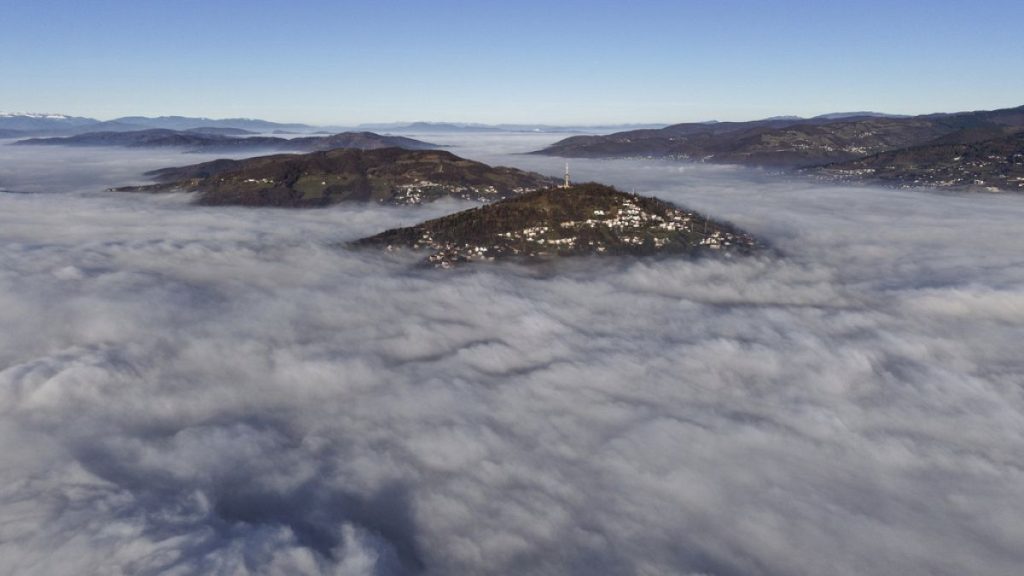Sarajevo, the capital of Bosnia and Herzegovina, experienced a severe air pollution crisis on Thursday, as a thick blanket of smog enveloped the city, grounding flights and prompting health warnings for residents. The air quality, measured by the Swiss-based monitoring company IQAir, reached an alarming Air Quality Index (AQI) of 225, classifying it as “extremely unhealthy” and ranking Sarajevo as the third most polluted city globally on that day. This hazardous air quality, described by residents as “unbearable” and “suffocating,” poses significant health risks, particularly for vulnerable populations such as those with heart conditions. The situation underscores the persistent and pervasive air pollution challenges faced by Balkan cities, particularly during the winter months.
The primary culprit behind Sarajevo’s recurring air pollution woes is the widespread reliance on coal and wood for heating, a common practice throughout the Balkans during the colder months. These combustion-based heating methods release particulate matter and other pollutants into the air, contributing significantly to smog formation. Sarajevo’s geographical location, nestled in a valley surrounded by mountains, further exacerbates the problem by trapping the pollutants and preventing their dispersal. This creates a stagnant air mass that accumulates harmful substances, exposing residents to prolonged periods of unhealthy air. The combination of geographical vulnerability and outdated heating practices creates a perfect storm for air pollution crises, jeopardizing the health and well-being of Sarajevo’s citizens.
Beyond the immediate health concerns, the air pollution crisis in Sarajevo highlights deeper systemic issues, including inadequate urban planning, overconstruction, poverty-induced reliance on inefficient heating options, and traffic congestion caused by older, more polluting vehicles. These factors contribute to a complex web of interconnected problems that amplify the impact of air pollution. Poor urban planning, for example, can impede air circulation and trap pollutants, while overconstruction can reduce green spaces that would otherwise help filter the air. Poverty forces many residents to rely on cheaper but more polluting heating options like coal and wood, perpetuating the cycle of air pollution. Similarly, the prevalence of older vehicles on the roads adds to the pollution burden, further degrading air quality.
The lack of effective action from authorities to address these underlying issues has fueled public frustration and concern. Despite promises to improve environmental standards, particularly in light of aspirations for European Union membership, the Balkan region has a history of neglecting environmental issues. This inaction is evident in the persistent pollution of rivers, inadequate recycling efforts, and the slow pace of transitioning to cleaner energy sources. The air pollution crisis in Sarajevo serves as a stark reminder of the urgent need for concrete measures to address these systemic problems and protect public health. The lack of progress underscores a disconnect between political rhetoric and tangible action, leaving citizens feeling abandoned and vulnerable to the detrimental effects of air pollution.
The regional scope of the air pollution problem is evident in the fact that Belgrade, the capital of neighboring Serbia, also experienced “unhealthy” air quality on the same day, with an AQI of 170. This highlights the shared challenges faced by Balkan cities and the need for regional cooperation to address the root causes of air pollution. The widespread reliance on outdated energy sources, coupled with geographical vulnerabilities and inadequate environmental regulations, creates a transboundary problem that requires collaborative solutions. The simultaneous occurrence of unhealthy air quality in both Sarajevo and Belgrade emphasizes the interconnectedness of the region’s environmental challenges and the need for a coordinated approach to mitigation.
The immediate consequences of the severe smog in Sarajevo included flight cancellations due to poor visibility and advisories for drivers to exercise extreme caution. Many residents resorted to wearing face masks as a protective measure against the harmful air quality, a stark visual representation of the pervasive nature of the pollution. The disruption of daily life, coupled with the health anxieties caused by the hazardous air, underscores the profound impact of air pollution on the city. The situation serves as a wake-up call for authorities to prioritize environmental protection and implement effective measures to improve air quality, safeguarding public health and ensuring a sustainable future for Sarajevo and the wider Balkan region. The air pollution crisis demands a comprehensive and sustained response that addresses both the immediate health risks and the underlying systemic issues contributing to the problem.

